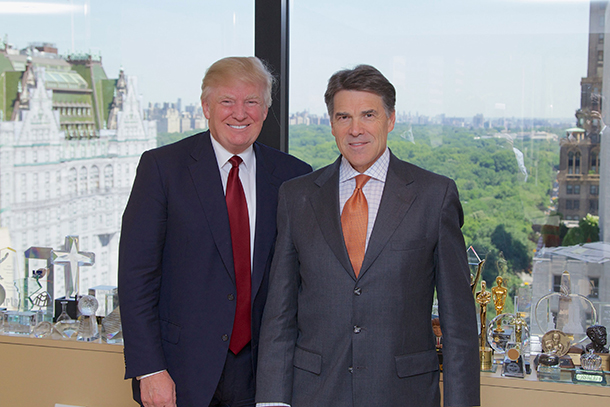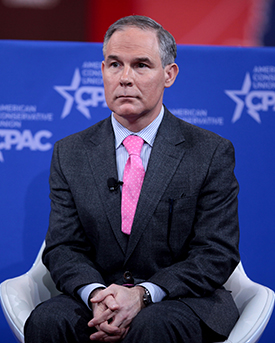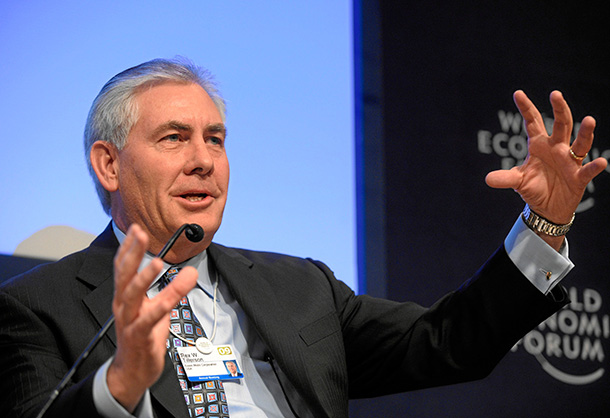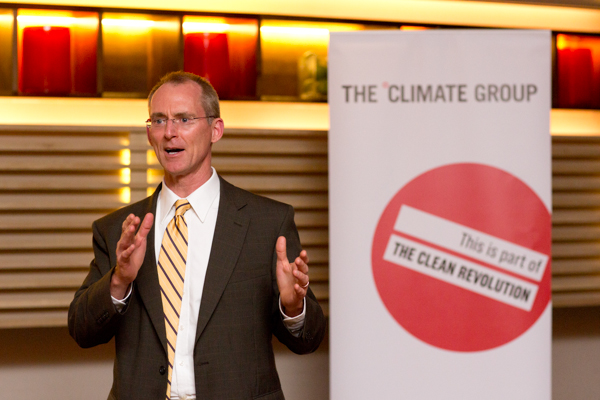Trump’s (Mostly) Anti-Climate Crew
Air Date: Week of December 16, 2016

Former Texas Governor Rick Perry visited Donald Trump in New York City in 2013. (Photo: Governor Rick Perry, Flickr CC BY-NC-ND 2.0)
President-Elect Donald Trump's cabinet choices tilt toward climate denial. Living On Earth Host Steve Curwood and former Republican Congressman Bob Inglis discuss how the Trump nominees for Environmental Protection Agency Administrator, Energy Secretary and Secretary of State might lead on the environment and climate policy.
Transcript
CURWOOD: From the Jennifer and Ted Stanley studios at the University of Massachusetts Boston and PRI, this is Living on Earth. I’m Steve Curwood. President-elect Donald Trump has a somewhat ambiguous stand on the need for climate action, at times calling global warming a hoax and at other times saying he has an open mind. So far his cabinet selections reflect that ambiguity. Mr. Trump named Oklahoma Attorney General Scott Pruitt as Administrator of the Environmental Protection Agency and former Texas governor Rick Perry as Secretary of Energy, and both men deny the science of climate change.
On the other hand Mr. Trump has selected ExxonMobil CEO Rex Tillerson to be Secretary of State, a man who has spoken in support of the Paris Climate Agreement, though his company does have a troubling history of climate denial.
For a Republican perspective on these choices we turn now to former South Carolina GOP Congressman Bob Inglis, who is a strong proponent of a carbon tax, and director of the free-market environmental organization, RepublicEN. Welcome back to Living on Earth, Congressman.
INGLIS: Great to be with you, Steve. Thank you.
CURWOOD: So, what was your immediate reaction when you heard that Scott Pruitt had been nominated to head the EPA by the Trump administration?
INGLIS: Well, it is alarming when somebody that's going to be put in charge of the EPA seems to have the goal of undoing what the EPA does, and that's...you want to someone to have passion for their work, but not exactly...I guess this is sort of un-passion. It's like passionate for undoing the work of the agency that he would head.
CURWOOD: How do you think his antifederal regulation ideology will inform his decisions as head of the Environmental Protection Agency?
INGLIS: I think you have the right word, Steve. The concern is "ideology". I can identify with this because for six years in Congress, I said climate change was hooey, nonsense, don't need to worry about it. I didn't know anything about it except that Al Gore was for it, and I was from a red state so therefore I chose teams. It was a rather an ignorant position on my part. But if you can move away from the ideology and say, listen, it matters not blue flag or a red flag. Let's not rally to this flag of a partisanship ideology. Let's rally to the American flag, and to the flag that can lead the world, you know. And so, ideology is what concerns us, yes, about Mr. Pruitt. Can he open his mind to the science of climate change?
CURWOOD: Now, Mr. Pruitt has that the American people are, well, we're tired of seeing billions of dollars drained from the economy due to what he calls “unnecessary EPA regulations”. What do you expect him to roll back on?
INGLIS: Well, the early returns aren't good, and they indicate that he's mostly looking at rolling back all action on climate change. We, at RepublicEN.org aren't big on the Clean Power Plans as a regulatory...it's a very clumsy way of dealing with climate change. Now, in fairness to President Obama, the reason he did that is that he couldn't get through Congress what I'm talking about, and if he were on the line with us right now I think President Obama would say, Inglis, listen, if you had some votes in the Republican conference for what you're talking about I could've worked on that, and I would have happily worked on that because it would be a worldwide, economy-wide solution. But you don't have those votes, and that's why I had to do the Clean Power Plan. But, so if Scott Pruitt is talking about a different approach that's OK, but to have no approach...well, that's really a problem if you're charged with protecting our air and water and land at the EPA.

Oklahoma Attorney General Scott Pruitt at the Conservative Political Action Conference (CPAC) in National Harbor, Maryland. (Photo: Gage Skidmore, Flickr CC BY-SA 2.0)
CURWOOD: Well, Congressman Inglis, what do you make of the nomination of Rex Tillerson for Secretary of State? Mr. Tillerson is on the record for saying there should be a carbon tax and that the Paris climate deal is a good thing. How does he fit in with the Trump crew?
INGLIS: In some ways, I'm very excited about Rex Tillerson's role here. I have concerns that are unrelated to that about, you know, the friend of Russia and all that. That's separate, but if we're talking about the climate action know the good news about Rex Tillerson is for years now he has said that the way to fix this problem is to have a revenue neutral, that means you cut taxes somewhere else if you're going to put on a carbon tax. Border adjustable, that means you impose it on imports as though they were produced here. Revenue neutral border adjustable carbon tax. So, we at RepublicEN.org have long endorsed the Exxon plan on that. They haven't endorsed us. We would like for them to endorse us, but they haven't done so. But we also believe that the company ExxonMobil is the most important company on the planet for solving climate change. The company stands to make a lot of money on a carbon tax. Well, now, we think that's great. They could be a very important force on the planet for solving climate change, and I hope that Rex Tillerson will take those views into the cabinet room and say that to President Trump.
CURWOOD: Well, a lot of folks, though, are saying that the that the major oil companies, the big oil companies, are a problem for climate protection with their power, and say that Mr. Tillerson will likely be approving Keystone XL if it came in front of the State Department again and other gas and oil pipelines, although we don't know his stand on the route of the Dakota access pipeline. What do you say to folks who say that these fossil fuel companies and the company that Mr. Tillerson has built are really central to the problem of climate protection?
INGLIS: Well, and, of course, there are some legal actions against ExxonMobil at this point about what they knew and when they knew it, whether they were deceiving shareholders. That's quite an issue for them because you know if those allegations were proven it would make the tobacco cases look like a Sunday school account, you know, I mean, we're talking damages that would really make the tobacco case look like a very small case. So, and it depends on what company you're talking about. In the case of ExxonMobil, their portfolio, as I understand it, has a great deal of natural gas, and so what I was saying earlier makes sense. They would do well in a carbon tax environment.
If your portfolio is more petroleum and less natural gas then where you sit determines where you stand. You might not be for a carbon tax. But I hope that Rex Tillerson would be able to have that kind of influence on the administration, and by the way, Steve, we at RepublicEN.org have got sort of a strange position compared to our friends on the environmental left on those pipelines. We think they’re fine to build. That's the best way to transport those products. If you price carbon dioxide, though, what's passing through there might not pass so much in a carbon priced environment, and so if somebody wants go ahead and build what may turn out to be a white elephant pipeline, go right ahead, knock yourself out. So we hope they're factoring that into their decision-making about whether to spend all that money on those pipelines, but if they're not, woe to them because what I think most...Where the smart money has already gone on this is the smart money assumes there's going to be a price and carbon dioxide and it's going to affect the value of projects like Keystone XL.
CURWOOD: You mentioned that Exxon, of course, is dealing with charges from a couple of states Attorneys General at least on covering up what they knew about climate disruption and fossil fuels. How much is Rex Tillerson tainted by that historic Exxon denial, do you think?
INGLIS: It'll be interesting to have him under oath answering questions. Of course, he's going to be answering questions. I would think that those can be very difficult questions to answer because it could...It's sort of like Donald Trump's tweets. It could affect the market price of Exxon stock depending on what those answers are, you know, and so I would think that he's going to have very careful legal counsel on how and what he can answer. I generally understand from press accounts, and I don't…have no independent information on this, but that he was a force behind changing the company's funding of the denial machine. I don't know that for sure though and that's a guess what will be the issue in the confirmation hearings, is "Mr. Tillerson, were you continuing the denial payments or were you at the helm moving the company away from those denial payments?" It's pretty clear that they used to deny...They used to be a major funder of the denial machine.

ExxonMobil CEO Rex Tillerson. (Photo: World Economic Forum, Flickr CC BY-NC-SA 2.0)
CURWOOD: And, Bob, what you make of Mr. Trump's selection of former Texas Gov. Rick Perry as Secretary of Energy? And you may recall that during the Republican primary debates Rick Perry famously couldn't remember the name of the Department of Energy as one of three departments he said he'd abolish.
INGLIS: Saturday Night Live would have an awful lot of fun with that. I think that… I have heard it said that Rex Tillerson would've been a great choice for Department of Energy because obviously he knows more about energy than anybody else, really, nearly, on the planet, so I don't know how much Rick Perry knows about that. I assume that by being in Texas he's had a great deal to do with energy. The question is whether he knows much about the nuclear stockpile and the issues involved there, so it's another case where somebody would be at the top of an agency with passion for undoing the agency rather than passion for doing the work of the agency.
CURWOOD: So, what kinds of support do you think there is in the incoming Congress for a major tax overhaul that would include a revenue neutral carbon tax?
INGLIS: I think it's stronger than it looks. On the surface it looks like there wouldn't be much support, but it's sort of like what's going to happen in healthcare. If you go forward with repealing the Affordable Care Act, then that has a real impact on some real people's lives, and so same the thing happens on climate change. If you repeal the Clean Power Plan, if you say that was not the right answer, and as we said earlier we at RepublicEN.org don't think it's right answer, we think there is a much better answer, but if you once you are in control and have power and you undo something, then it becomes incumbent upon you to propose the alternative, and so the incoming Congress, while on the surface it looks like they're not so into some sort of tax reform that would involve an inclusion of a carbon tax and cutting taxes elsewhere, it could well become incumbent upon that Congress to do exactly that because of the undoing of the Clean Power Plan.
CURWOOD: Today, how much of the incoming Congress is onboard with the validity of climate science?
INGLIS: You know, it's interesting, Steve. It's hard to know because typically what people like me at RepublicEN.org do is, we ask people way too often if they believe in climate change. What we really need to be asking them is, "Do you think we can solve climate change and particularly if it's a conservative, ask the question this way, "Can free enterprise solve climate change?" That starts a very different conversation because what's gone on too much is that we who are concerned about climate change typically ask a belief question, and it's sort of like asking if you believe in our religion of climate change, and, if you come from a red state, no, you don't buy in to that religion. But, if we change the question and start the conversation a different place, we think we can have a much more successful conversation.

Republican politician Bob Inglis advocates for free-enterprise action on climate change. (Photo: The Climate Group, CC BY 2.0)
CURWOOD: Bob Inglis is a former Republican congressman from South Carolina. Thanks so much, Bob, for taking the time with us today.
INGLIS: Great to be with you, Steve.
Links
More on former Congressman Bob Inglis
Our previous reportage on Scott Pruitt’s EPA lawsuits
Rick Perry’s three agencies debate stumble
Living on Earth wants to hear from you!
Living on Earth
62 Calef Highway, Suite 212
Lee, NH 03861
Telephone: 617-287-4121
E-mail: comments@loe.org
Newsletter [Click here]
Donate to Living on Earth!
Living on Earth is an independent media program and relies entirely on contributions from listeners and institutions supporting public service. Please donate now to preserve an independent environmental voice.
NewsletterLiving on Earth offers a weekly delivery of the show's rundown to your mailbox. Sign up for our newsletter today!
 Sailors For The Sea: Be the change you want to sea.
Sailors For The Sea: Be the change you want to sea.
 The Grantham Foundation for the Protection of the Environment: Committed to protecting and improving the health of the global environment.
The Grantham Foundation for the Protection of the Environment: Committed to protecting and improving the health of the global environment.
 Contribute to Living on Earth and receive, as our gift to you, an archival print of one of Mark Seth Lender's extraordinary wildlife photographs. Follow the link to see Mark's current collection of photographs.
Contribute to Living on Earth and receive, as our gift to you, an archival print of one of Mark Seth Lender's extraordinary wildlife photographs. Follow the link to see Mark's current collection of photographs.
 Buy a signed copy of Mark Seth Lender's book Smeagull the Seagull & support Living on Earth
Buy a signed copy of Mark Seth Lender's book Smeagull the Seagull & support Living on Earth

